|
|
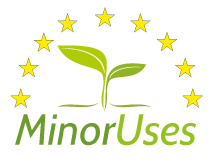
NEWS
from the
European MINOR USES COODINATION FACILITY
Newsletter n° 17 ( Winter Edition Winter Edition ) )
|
|
|
Dear readers,
It’s almost the end of the year, and nearly time for the holiday break. We at MUCF would like to wish you joyful holidays and all the best for the New Year.
Source: Pixabay
The MUCF team hopes that you enjoy the 17th newsletter (winter edition: with a brief recap of 2022 activities and developments). We have several meetings coming up in 2023 that we couldn't wait to tell you about, and we hope there will be active participation.
Barbara Edler (Coordinator), on behalf of the MUCF team 
|
|
|
A SCIENTIFIC OFFICER JOINED THE MUCF
On the 1st September 2022, Antoine Martin joined the MUCF team as Scientific Officer.
With a master’s degree in Plant Protection from ENSAIA (Nancy, France), Antoine started working in product development and homologation.
For the past 5 years, he has been working for ANSES as a scientific and technical evaluator for the efficacy section of the authorisation reports for pesticides (both conventional and organic) and fertilisers. His skills are now dedicated to scientific matters within the MUCF.
 |
|
He participated in the CEGs and HEG autumn 2022 meetings, where he had the opportunity to meet several minor uses experts face-to-face. Furthermore, he has been already involved in producing various documents, e.g., Captan statement, which was shared with SCoPAFF to support CEG Fruit experts.
Antoine speaks fluent French and English, and has good knowledge of German.
|
|
|
|
EUROPEAN MINOR USES DATABASE (EUMUDA) UPDATE:
In cooperation with some MUCF experts, the MUCF prepared the ‘Survey 2022 on Minor Uses work in the EU Member States, plus the United Kingdom, Norway and Switzerland’. This survey is a continuation of a survey carried out in 2017, with additional questions validated by experts from several MUCF member countries. Survey results will be analysed, and the report be published in 2023.
At the moment, 22 countries have completed the survey, which will provide a broad vision of the situation in the EU Member States, plus the United Kingdom, Norway and Switzerland. The survey focuses on minor uses definitions and approval procedures in each country, as well as on risk evaluation and management.
To see the questions which were addressed in the survey:
|
|
|
MUCF LINKEDIN PAGE: FOLLOW US!
The MUCF recently created its own LinkedIn page. We will regularly post updates on the facility activities, MUCF meetings, and overviews on minor uses developments to contribute to improving the minor use situation in Europe. We look forward to seeing you on our LinkedIn page!
|
|
 |
|
|
|

After two years of remotely held meetings with European minor uses experts, in-person engagement was the key goal for the MUCF team for the Autumn 2022 CEG and HEG meetings. In Brussels, the commodity expert working groups (CEG) Fruits & Vegetables, Seeds, Herbs & Spices, Ornamentals and the horizontal expert working group (HEG) met for a 2.5-day long hybrid meeting, attended by a total of 225 participants.
A plenary session was held on the topic of basic and low-risk substances and how those substances could be used to solve minor uses needs.
|
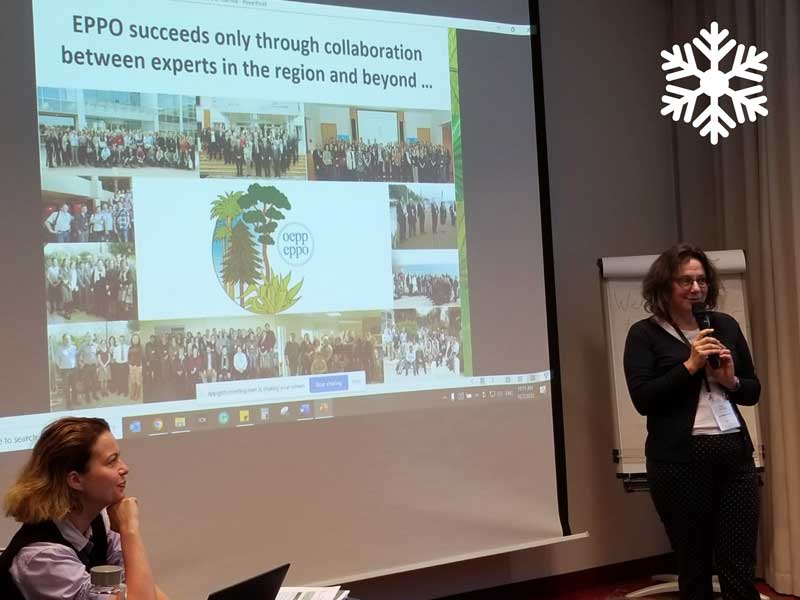
Ewa Matyjaszczyk (EPPO, standing) presented relevant EPPO Standards for efficacy evaluation of low-risk products during the Plenary Session.
In the bottom left corner, Barbara Edler, MUCF Coordinator.
|
|
As a meeting follow-up action, Patrice Marchand (ITAB) and the MUCF compiled a European basic and low-risk substance list, which is now published on the MUCF website:
Experts from 23 European countries were present. Registered participants from 11 different organizations (e.g. International Biocontrol Manufacturers Association, Copa-Cogeca, Euroseeds, CropLife Europe). The presenters and participants appreciated the convenience of the hybrid meeting format, as it made attending possible for some experts who were not able to travel to Brussels for the meetings.
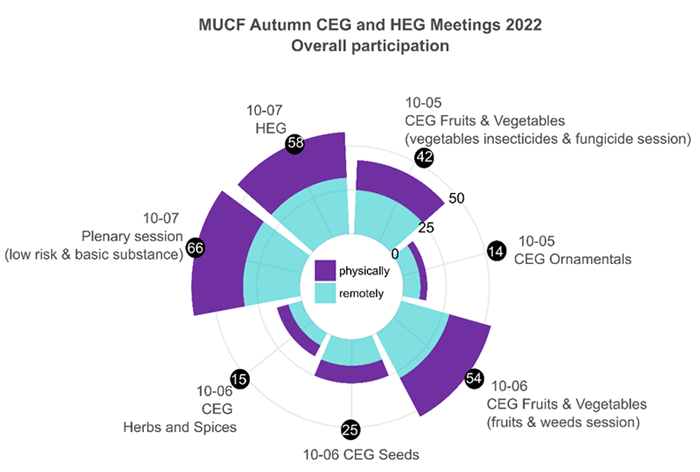
For Mr Jean-Claude Malet, a French expert on minor uses, this meeting was also the last one he attended in person before his retirement. He has been an active member of the MUCF for several years and contributed an enormous amount of knowledge and experience on this subject. He additionally chaired the CEG Fruits and Vegetables for more than three years. It is undeniable that his passion for agriculture has influenced the work of the MUCF in the past years. We thank him for his excellent inputs and wish him all the best for his retirement in 2023!
|
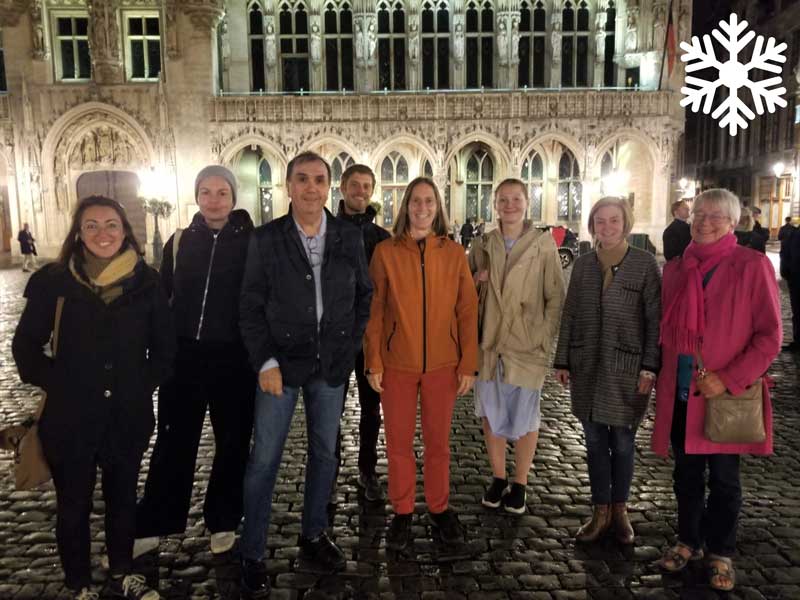
Mr Jean-Claude Malet (third person from the left) and participants of the MUCF autumn 2022 meetings in front of Brussels Grand Palace.
|
|
CEG Tobacco (2022-10-13) and CEG Mushrooms (2022-10-11) held their Autumn meetings remotely.
CEG hops held its meeting in Poperinge, Belgium, on 2022-11-08/09. The meeting was attended by 20 experts from 5 EU countries and the USA. The meeting highlighted experiences from the last hop growing season, plant protection issues in the individual EU countries, reports on notable hop trials and projects in EUMUDA in 2022 and an outlook on planned trial activities for 2023. General agenda topics were the concept of leaf wall area (LWA) calculation in hop production, the situation of the EU review of hops and EU MRLs, regulatory matters and the status of MRLs for different hop markets in the world (i.e. India, South Korea, Japan, Vietnam). During the meeting, CEG members informed the participants about a proposal on the sustainable use of PPPs and the amendment of Regulation (EU) 2021/2115. An important topic of the meeting was the increase of organic hop production in Europe and its likely further development.
|
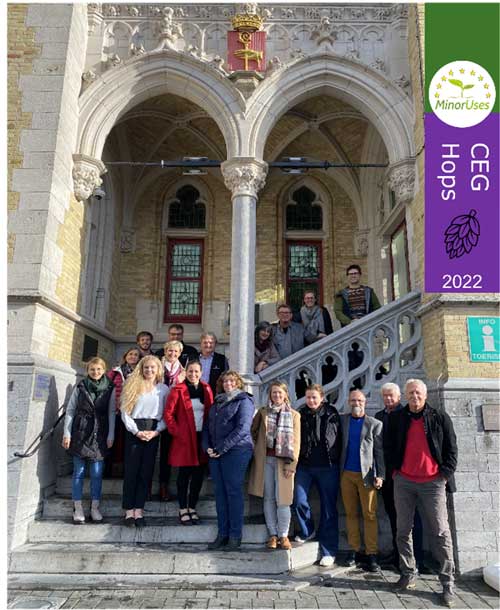
Several CEG Hops participants in front of Poperinge town hall.
|
|
In addition to many interesting technical subjects, the CEG Hops Chair and the meeting host (Inagro, Research & advice in agriculture and horticulture; https://inagro.be/) organised a visit to the hop farm of Mr Joris Cambie (an organic hop producer since 2001: click here for more information about the hop farm).
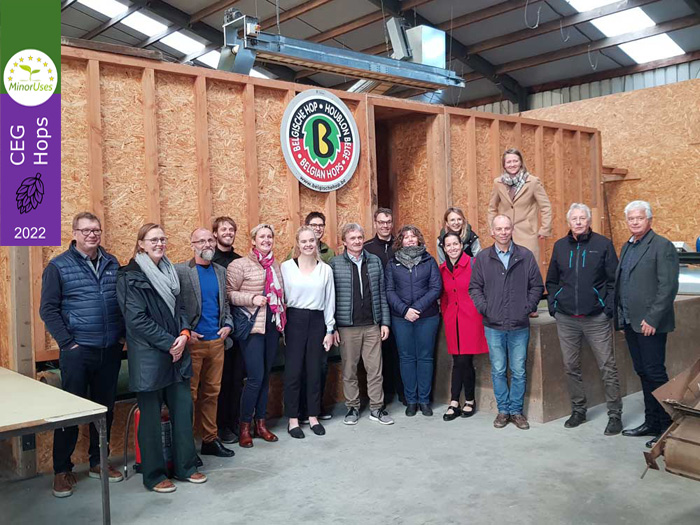
Several CEG Hops members visited the organic hop farm from Mr Joris Cambie in Poperinge. The participants had the opportunity to test Mr Cambies' organic beers after visiting the farm.
|
|
|

MEETINGS 2023
Tentative CEGs and HEG (jointly with Residue Expert Group, ReEG) spring meeting schedule for 2023. Dates may still be adjusted:
- CEG Mushrooms: 2023-02-23, 9:15 - 12:00
- CEG Herbs & Spices: 2023-02-27, 9:15 - 12:00 (proposed date, to be confirmed)
- CEG Fruits & Vegetables: 2023-02-28, 9:00 - 17:00
- CEG Ornamentals: 2023-03-06, 09:30 – 16:30
- CEG Seeds: 2023-03-10, 9:15 - 12:00
- HEG & ReEG: 2023-03-14, 9:00 – 15:30
- CEG Tobacco: 2023-03-21, 9:00 - 12:00
- CEG Hops: 2023-03-29, 9:30 - 17:30
- CEG Rice: The position of chairing the CEG Rice is still vacant.
All spring 2023 meetings are planned to be held remotely. Invitations and registration links for the meetings will be shared at the beginning of 2023.
CEG and HEG Autumn 2023 meetings will be held in one of the last two weeks of October 2023 as an in-person meeting. The country where the meetings will take place and the date of the meetings will be discussed during the 2023 CEG and HEG spring meetings. The agreed meeting dates for the 2023 autumn meetings will be announced in the 18th MUCF Spring 2023 Newsletter.
|
|
|

Belgium PPP database:
The Belgium website on plant protection and fertilising products (Fytoweb) is now available in 4 languages (Dutch, French, German and English). Searches in the database are possible in French, Dutch and now also in English. Next to the improved user-friendliness, a filter has been added to refine the results before or after a search. Filtering is possible for, for example, user category, authorisation status and type, nature and formulation type:
'Pesticide Action Plan' in Denmark
The ‘Pesticide Action Plan’ of the Danish Government has set aside a total of 1 million DKK for 2022 to assist applicants seeking authorisation for placing their alternative plant protection products on the market in Denmark. The goal is to increase the number of alternatives to synthetic plant protection products on the Danish market. More information on how Denmark financially supported applications for authorisation of alternative plant protection products in 2022 can be found at the following link:
International Hop Growers' Convention
A meeting organised by the Scientific-Technical Commission of the International Hop Growers' Convention will be held in Ljubljana, Slovenia from 25-29 June 2023.
For more information, please contact: Dr Florian Weihrauch
E-mail: Florian.Weihrauch@LfL.bayern.de
Website: LFL Bayern website
JOURNAL PUBLICATION ON MINOR USES:
A publication by Sandín-España, P.; Mateo-Miranda, M.; López-Goti, C.; Seris-Barrallo, E.; Alonso-Prados, J.-L. entitled ‘Analysis of pesticide residues by QuEChERS method and LC-MS/MS for a new extrapolation of maximum residue levels in persimmon minor crop’ is available in Molecules (2022) 27, 1517:
INTERESTING FACT ON A MINOR USE:
Etrog (Citrus medica), used in the Jewish Sukkot festival, held in December each year, is unique among citrus fruits in that only the external attributes are of commercial importance. An etrog can command as much as EUR 300 (occasionally EUR 1000 for a ‘perfect’ specimen) per individual fruit. A few citrus varieties are used in Europe to produce Etrog, for example the Diamante lemon from Italy or the Greek lemon. A historically well-known European Etrog cultivation area is Calabria in Italy. Limited PPP solutions are available for Etrog production.
Maintaining physical fruit quality requires the use of protective cushioning on the tree, at harvest, and in packaging. Growers use a wide range of chemical treatments pre- and post-harvest to reduce to a minimum the possibility of disfiguring pest infestations.
For more information on Etrog post-harvest handling, please refer to:
|
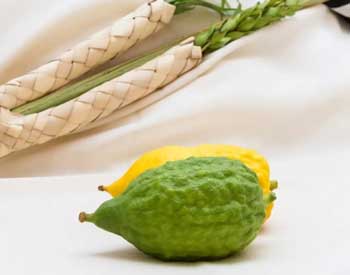
Green and yellow Etrog (Source: Museo del Cedro).
|
|
|
|
|
 |
The MUCF is hosted by EPPO and posts on EPPO’s Facebook page with the hashtag #MUCF and #minoruses |
 |
Follow the MUCF on their new LinkedIn page |
|
|
|
|
|
